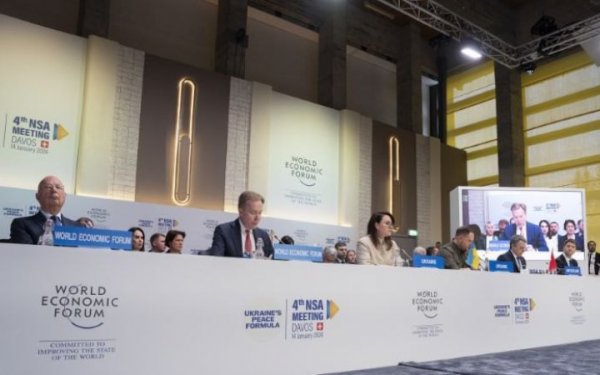The meeting participants considered the following points: “Withdrawal of Russian troops and cessation of hostilities”, “Restoring justice”, “Environmental safety”, “Preventing escalation and repetition of aggression”, “Confirmation of the end of the war”.
In Davos, participants in the meeting of national security advisers and foreign policy advisers of countries on the implementation of the Peace Formula considered the second five points of the Ukrainian peace formula and developments for their implementation.
This is stated on the president’s website.
They considered the following points of the Formula: “Withdrawal of Russian troops and cessation of hostilities”, “Restoration of justice”, “Environmental safety”, “Prevention of escalation and repetition of aggression”, “Confirmation of the end of the war”.
Withdrawal of Russian troops and cessation of hostilities (No. 6)
This point was presented by representatives of Lithuania and the Minister of Defense of Ukraine Rustem Umerov.
In particular, it was proposed to create an international working groupat the level of defense ministers and national security advisers, whose tasks will include developing and ensuring the adoption of an international agreement calling on Russia to completely cease hostilities and withdraw troops from Ukraine.
It is also necessary to jointly develop a mechanism for the withdrawal of Russian troops and armed formations from the occupied territories of Ukraine. The withdrawal of troops should contain:
- withdrawal of Russian units and military personnel from temporarily occupied territories;
- disbandment and complete disarmament of military terrorist organizations in temporarily occupied territories;
- removal of military equipment and weapons from temporarily occupied territories for their disposal.
Restoring justice (No. 7)
This point was presented by representatives of the Netherlands, as well as Prosecutor General Andrey Kostin and Deputy Minister of Justice of Ukraine Irina Mudraya.
They noted that efforts to ensure Russian accountability are based on five important components:
- ensuring effective investigation at the national level;
- ensuring responsibility for the crime of aggression; continued strategic partnerships with international justice mechanisms;
- promoting bilateral and multilateral interstate partnerships;
- ensuring that Russia pays reparations to Ukraine and the Ukrainian people in accordance with international law.
- Irina Mudra, for her part, noted the importance of not only further increasing sanctions pressure on the aggressor country, but also creating a compensation mechanism to compensate the victims and restore the country.
According to her, the international compensation mechanism should consist of three elements:
- an international register of losses,
- Compensation fund, which should be filled primarily with Russian sovereign assets.
< li>compensation (or claim) commission,
Environmental safety (No. 8)
This point was presented by representatives of Germany, Finland, Bulgaria and the First Deputy Prime Minister of Ukraine Yulia Sviridenko and the Minister of Ecology of Ukraine Ruslan Strelets.
They noted the need to unify the methodology for calculating losses and introduce the definition of “ecocide”< /b>into international law, which is currently being done by the International Working Group on the Environmental Consequences of War, co-chaired by Andriy Ermak and former Prime Minister, former Swedish Ministry of Foreign Affairs, Margot Wallström.
Margot Wallström reported that the group will soon present it to the President of Ukraine Vladimir Zelensky your report – Environmental Treaty. This document will contain many specific recommendations both for Ukraine and for the international community.
Prevention of escalation of war and repetition of aggression (No. 9)
Head of the Office President Andriy Ermak presented this item together with the representative of Great Britain.
Ermak spoke about how the draft Kyiv Security Treaty was developed, which later formed the basis of the G7 Joint Declaration on Support for Ukraine, adopted in July 2023 in Vilnius.
For his part, Deputy Head of the OPU Igor Zhovkva noted that The G7 General Declaration on Support for Ukraine is the basis for a new comprehensive system for preventing the escalation of warand repetition of aggression. Another 15 countries confirmed their interest in starting bilateral consultations on security guarantees for Ukraine.
Confirmation of the end of the war (No. 10)
Deputy Head of the Office Head of State Andriy Sibiga and Minister of Justice of Ukraine Denis Malyuska presented the work of the working group on the implementation of this point.
Maluska recalled that Ukraine had repeatedly tried to negotiate mutual relations with Russia and draw up a corresponding international treaty, and each time the Russian Federation stopped implementing it and simply ignored it. This applies to both the treaty on a common border, and the “grand” treaty of friendship and cooperation, and the Budapest Memorandum, and the Minsk agreements, as well as the Pereyaslav Articles of 1659.
According to the minister, the agreement which will confirm the end of the warshould:
- be based on the Peace Formula¦
- be multilateral, that is, signed not only by Ukraine and the Russian Federation, but also by countries -guarantors,¦
- to be comprehensive and regulate all areas affected by the war.
The terms of the agreement must be clear and legally binding, and the agreement itself must be ratified by the parliaments of the participating countries.
More about the forum in Davos
- The World Economic Forum in Davos started today from the fourth meeting of national security advisers on the Ukrainian Peace Formula. 81 countries and international organizations took part in it.
- The Forum will last until Friday, January 19.
- Previously it became known that the President of Ukraine Vladimir Zelensky will make a special speech at the Forum on the panel “Achieving security and cooperation in a fragmented world” on October 16 . Together with him, the executive director of the World Economic Forum, Klaus Schwaab, and the president of the WEF, Bjorge Brende, will take part in the panel.
- Many world leaders and politicians will take part in the Forum, in particular, the President of Israel Isaac Herzog, the newly elected President of Argentina Javier Miley , French President Emmanuel Macron and US Secretary of State Antony Blinken.

